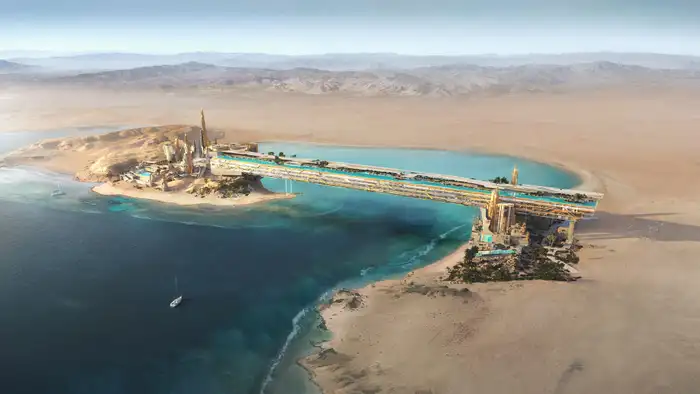Neom is a ’50-plus-year plan,’ says Saudi Arabia’s finance minister

The planned design for The Line in Neom.
Saudi Arabia’s finance minister has described the kingdom’s ambitious Neom project as a “very long-term program” and returns should not be expected in the coming years.
“Neom is a 50-plus-year plan. If anyone is thinking Neom in its grand size is going to be built and operated and making money in five years, that’s foolish. We are not foolish. We are wise people,” Mohammed Al Aljaadan said on Tuesday in comments reported by Reuters.
“Some projects within Neom will make returns in the short to medium term, but this is a very long-term program.”
Neom, a futuristic development in Saudi’s north, has become the centerpiece of its Vision 2030 plans to transform the oil-dependent economy. Some aspects of Neom, such as The Line, have been scaled back this year amid lower oil revenues and other issues.
Earlier this month the CEO of Neom abruptly stepped down after six years in the role. No explanation was given for this departure.
Saudi Arabia forecast a $26.8 billion deficit for 2025, or about 2.3% of GDP, in its Budget statement on Tuesday.
Aljaadan said in a press release that the Kingdom had maintained its strong financial position and that its development projects and plans had not been significantly affected.
Total expenditure in 2025 is forecast to be 1.285 trillion riyals ($342 billion), while total revenue is expected to be 1.184 trillion riyals ($315 billion).
Saudi Arabia’s strategy for economic transformation has captured global attention but relies on hundreds of billions of dollars in investment in areas such as tourism, entertainment, and infrastructure.
The Saudi economy has contracted in recent years as the changes take place and global oil prices have declined.

A rendering of an infinity pool that forms part of Neom planning.
In 2022, Saudi Arabia was the fastest-growing G20 economy, according to the IMF. Its GDP contracted in 2023.
The Saudi government has forecast 0.8% growth this year, and a sharp acceleration in 2025 as non-oil activities take off.






